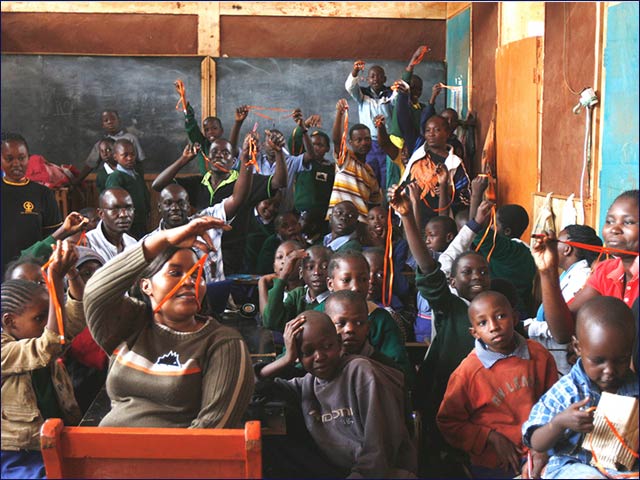By Avigayil Kadesh
If you can put data on a USB drive, why not put an entire operating system on a stick?
It’s a simple but brilliant idea. Nissan Bahar of Israel and Francesco (Franky) Imbesi of Italy are making it happen in remote places of the world where computers aren’t a dime a dozen. They discovered that five billion people, or 70% of the world’s population, have no access to personal computing, and they intend to change that.
The $7
Keepod thumb drive is loaded with a unique version of Google's Android 4.4 operating system. Plug it into the USB port of any old laptop, netbook or desktop, and – voila! – you’ve got a personal computer with your own password-protected settings, programs and files.
Bahar and Imbesi have introduced the Keepod (Hebrew for “porcupine” but with obvious wordplay in English) to a school in the Mathare slums of Nairobi, Kenya, through a partnership with the organization LiveInSlums. They use refurbished computers that would otherwise clog landfills.
“We’re breaking a few paradigms in the world of computing and digital devices,” says Bahar.
“There are a lot of initiatives for bringing computers to developing countries, but it’s impossible to bring a laptop per person. There’s not enough material in the world for that. Our approach is that instead of providing a personal computer, we use shared computers and provide a stick with an operating system on it so you have your own PC environment on a shared computer.”
He likens the model to public transport. “Not everyone can have a shiny car, so you hop on a bus.”
The other paradigm-smashing aspect of Keepod is the notion that fancier is better. Bahar maintains that using basic pre-owned computers without hard drives solves lots of cyber-security problems.
“Instead of manufacturing cheap computers -- which will never be cheap enough -- we reuse old computers. In the US alone, 85,000 computers are thrown out every single day. We can give a big percentage of them a new life with Keepod in Nairobi or anywhere else, and that one computer can serve 25 to 30 people every week. Why continue to manufacture cheap hardware when you have all this material available? It’s an ecosystem of ideas and things together.”
Principles ahead of profit
Bahar and Inbesi come from a background in information security and enterprise solutions.
“We started selling to banks and telecos across Europe, and then about a year ago we started to think how to leverage this technology to do something better than selling it to executives,” says the 38-year-old Israeli.

Schoolchildren in Nairobi with Keepods around their necks “We had a feeling we could work it out to give [computer] access to everyone. We’ve put principles ahead of profit and completely discontinued our profit enterprise. People say we’re insane.”
“Since then, things have been completely crazy,” Bahar says with a laugh.
Media attention led to requests to set up more than 130 Keepod hubs in more than 50 countries on six continents.
“The coolest thing is that we moved something at the people-to-people level. Keepod is really about grassroots activity that anyone can do with an old laptop and a Keepod [stick] or two in a community center or school where it’s needed.”
The duo’s software is housed in ordinary Israeli-made SanDisk flash drives but it can be stored on any flash drive.
“We will have it available for download soon,” says Bahar. “I work with a team here and we have collaborators in the US, China and other places. We are opening it more and more as an open-source project so people anywhere can contribute code.”
He’s quick to point out that while he and Inbesi are measuring impact rather than profits, “We are not doing this as a charity but as a sustainable social business. It must create profit to stay viable, but instead of trying to maximize profits we just sell the product at cost. Everything we make we give back to the community.”
The sale of each Keepod device generates about $2 in profits.
In Mathare, for example, this cash is funneled back through LiveInSlums to support its projects in public health and education. But the product itself is a vehicle for such projects.
“Providing this school with refurbished computers and Keepod devices for each child will gain them access to tools that will help kids learn reading, writing, math, and technology, in turn providing them with a chance for a better future,” says Bahar.
In addition, Keepod plans to establish local community centers equipped with Keepods and recycled computers, run by specially trained local residents. “These centers are our version of a microcredit project. Giving computing resources to the community will allow local Mathare entrepreneurs to create their own initiatives, mentored by the center staff, and to gain access of crowdfunding platforms such as Indiegogo,” says Bahar.